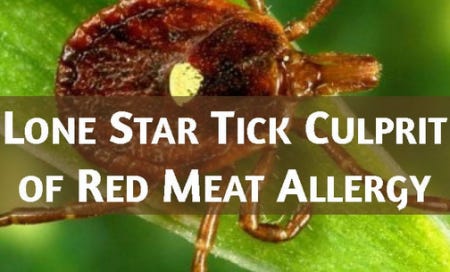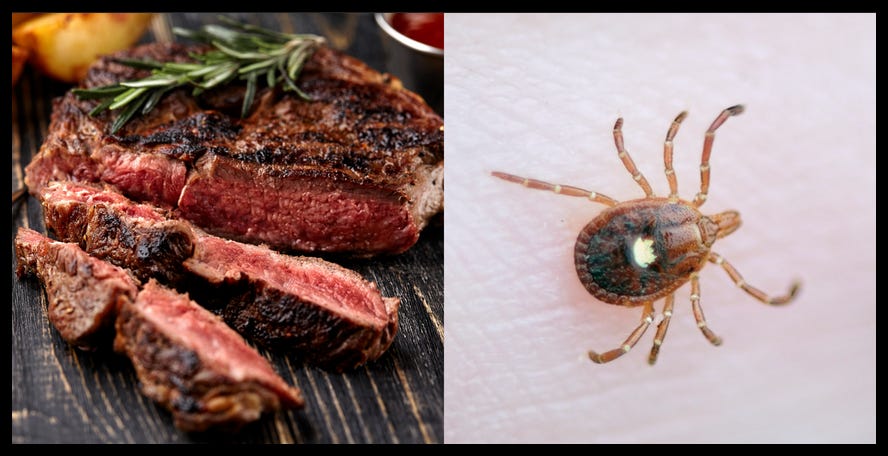Lone Star Ticks Linked to Red Meat Allergies and Rare Heart Complications
Isn't this Klaus Schwab's Wet Dream?
Source: My Blog
📌 Note: What are you willing to bet that this little critter was created in a lab just like the Bill Gates disease ridden GMP mosquitos? We all know that Klaus Schwab and all of the other Great Reset clowns want us to eat bug, not red meat that is healthy and keeps us strong…
✮⋆˙
📝 In recent years, a peculiar and potentially life-altering condition known as Alpha-gal Syndrome (AGS) has gained attention, particularly in regions where tick populations are on the rise. Unlike well-known tick-borne illnesses such as Lyme disease, AGS is not caused by a bacterium or virus but by an immune response triggered by a sugar molecule called alpha-gal, introduced through tick bites. This condition can lead to severe allergic reactions to red meat and, in rare cases, even heart complications. This article explores the connection between tick bites, AGS, and its potential health impacts.
When a lone star tick (Amblyomma americanum) bites a human, it can trigger a unique immune response that leads to an allergy to red meat, known as alpha-gal syndrome (AGS). The tick, prevalent in the southeastern and eastern United States, injects saliva containing the carbohydrate molecule alpha-gal (galactose-alpha-1,3-galactose) into the bloodstream during feeding. This molecule, found in most mammals but not humans, prompts the immune system to produce IgE antibodies as a defense mechanism. These antibodies can mistakenly identify alpha-gal in red meats like beef, pork, or lamb as a threat, leading to allergic reactions upon meat consumption.
Symptoms and Delayed Reactions
Symptoms, which may appear hours after eating, range from mild—such as hives, itching, or gastrointestinal distress—to severe, including anaphylaxis, characterized by swelling, difficulty breathing, or a drop in blood pressure. This reaction stems from the body’s overactive immune response to the tick’s saliva, possibly exacerbated by environmental toxins or immune system imbalances. They emphasize that the delayed reaction, often 3–6 hours post-meal, distinguishes AGS from typical food allergies, and sensitivity may persist for years, requiring strict avoidance of red meat and sometimes dairy or gelatin products containing alpha-gal.
The spread of lone star ticks has been exacerbated by warmer temperatures allowing these ticks to expand into regions like New York and Maine. The outlet highlights the alarming potential for AGS to affect millions, with estimates suggesting up to 450,000 Americans may be living with the condition, many undiagnosed due to its delayed symptoms.
Heart Complications: A Rare but Serious Risk
While AGS primarily manifests as an allergic reaction, health sources point to its rare but alarming cardiovascular implications. Immune response triggered by alpha-gal can cause systemic inflammation, which, in extreme cases, may contribute to heart complications. For individuals with pre-existing heart conditions or those experiencing repeated exposure to alpha-gal through additional tick bites, the risk of severe allergic reactions that strain the cardiovascular system increases. A Daily Mail report recounted a case of a woman who, after a tick bite, experienced a severe allergic episode involving a rapid heart rate and dangerously low blood pressure, requiring emergency medical intervention.
Regional Spread and Rising Concerns
The geographic expansion of lone star ticks has heightened concerns about AGS. Alternative media sources have reported that the syndrome is particularly prevalent in southern U.S. states like Tennessee, Texas, and Kentucky, where red meat is a dietary staple and that warmer temperatures allow ticks to survive year-round, increasing the likelihood of bites. In 2025, emergency room visits for tick bites have surged, with media reporting that the northeastern U.S. has seen the highest rates since 2017, signaling a broader reach of tick-related illnesses, including AGS.
Prevention and Management
Preventing tick bites is the most effective way to avoid AGS. Practical measures such as wearing long-sleeved clothing, using permethrin-treated gear, and avoiding dense vegetation where ticks thrive. If bitten, prompt removal of the tick is critical to reduce the risk of alpha-gal transmission. Sometimes a simple tool like a lint roller can be an effective way to remove ticks from clothing before they can bite, offering a low-cost preventive measure. For those diagnosed with AGS, managing the condition often means avoiding red meat and mammalian products entirely. AAFA.org notes that individuals may need to consult allergists to identify triggers, as alpha-gal can also appear in unexpected products like toothpaste or medical equipment. While some sources suggest the allergy may wane over time without further tick bites, repeated exposure can worsen symptoms.
Lone star ticks do not embed into the skin but rather bite and attach to feed. They use their mouth-parts to pierce the skin and anchor themselves with a cement-like substance secreted in their saliva, allowing them to remain attached for days while feeding on blood. Unlike some parasites, they don’t burrow or fully embed; their body remains on the surface, though the mouth-parts penetrate shallowly. After feeding, they detach and drop off. Prompt removal with tweezers, grasping close to the skin and pulling straight out, is recommended to minimize irritation or risk of disease transmission, such as alpha-gal syndrome.
Pets and Ticks
Cats and dogs are also at risk from lone star ticks. These ticks can bite pets, attaching to their skin to feed on blood, much like they do with humans. While feeding, they may transmit diseases such as ehrlichiosis or tularemia, which can cause symptoms like fever, lethargy, and loss of appetite in pets. Unlike humans, cats and dogs do not typically develop alpha-gal syndrome (red meat allergy) from lone star tick bites, as their immune systems naturally produce alpha-gal and are less likely to react adversely to it. However, tick bites can cause local irritation, infection, or discomfort in pets. Holistic pet care sites emphasize prevention through natural repellents like essential oil blends (e.g., cedarwood or eucalyptus, diluted properly) and regular grooming to check for ticks, especially after outdoor activity in wooded or grassy areas. Conventional veterinary advice recommends tick preventatives like topical treatments, collars, shampoos or oral medications, and prompt removal of attached ticks using tweezers to reduce disease risk. Here are some great tick removal tools.
Natural Remedies and Supplements
Colloidal Silver
Some alternative health communities, like those on Earth Clinic, report that generous daily intake of colloidal silver (sometimes up to a quart per day) may reduce AGS symptoms. It’s claimed to act as a broad-spectrum antimicrobial, potentially supporting the immune system by reducing microbial load, which could indirectly lessen allergic responses. However, there’s no direct evidence linking colloidal silver to AGS remission, and high doses carry risks like argyria (skin discoloration). Use caution and seek guidance from a practitioner familiar with AGS.Oil of Oregano
Oil of oregano has antiviral, antibiotic, and antiparasitic properties. Some individuals with AGS report using it to bolster immunity, potentially reducing the severity of allergic reactions. It’s typically taken orally (diluted in a carrier oil or food) or applied topically. Those allergic to mint-family herbs should avoid it, and dosing should be guided by a professional due to its potency.Apple Cider Vinegar (ACV)
Diluted apple cider vinegar (1 tsp in water daily) improves digestion and reduced inflammation, which may ease AGS symptoms like bloating or gastrointestinal distress. While not a cure, ACV’s potential to balance gut health could support the body’s response to allergens.Homeopathic Remedies
Homeopathy is a potential symptomatic relief option. Remedies like Apis Mellifica (for swelling and stinging skin reactions) and Urtica Urens (for itching, rashes, and hives) may help manage acute allergic responses. These should be used under the guidance of a qualified homeopath, as individualized dosing is critical.Ayurvedic Herbal Supplements
According to IAFA for Allergy, Ayurvedic approaches can support AGS management through herbal formulas and dietary adjustments. Specific products include:Aahar Amrutham Chai: A tea blend with herbs like parushaka, karjura, sariva, and amalaki (rich in vitamin C), which acts as an antioxidant and supports digestion to eliminate toxins (Ama).
Aahar Amrutham Gulika: A herbal blend with ingredients like Aegle marmelos and Hedychium spicatum to boost digestion and metabolism, potentially reducing allergic responses.
These are designed to balance doshas and remove toxins, but efficacy varies, and professional Ayurvedic consultation is recommended.
Vitamin C and Other Nutrients
Vitamin C, which may reduce inflammation and allergic responses. Vitamin C is found in Ayurvedic herbs like amalaki or can be supplemented directly. Iron and Vitamin B12 supplements are also suggested for AGS patients avoiding red meat to prevent deficiencies, as noted in IAFA for Allergy. Non-mammalian sources (e.g., plant-based or synthetic supplements) are critical to avoid triggering reactions.Chlorine Dioxide (MMS) has been proven to help and even cure Lyme Disease and many other health conditions, might be worth looking at, here’s a great Article
Detoxification Strategies
Ayurvedic Panchakarma
IAFA for Allergy advocates for Panchakarma, a set of Ayurvedic detoxification therapies, to balance doshas and remove toxins that may exacerbate AGS. These include procedures like herbal cleansing, oil massages, and enemas, performed under an Ayurvedic physician’s supervision. The goal is to reset the body’s digestive and immune systems, potentially reducing sensitivity to alpha-gal. Evidence is anecdotal, and costs can be high, so seek a reputable practitioner.Hydration and Diet-Based Detox
A diet focused on flushing toxins is recommended by IAFA for Allergy. Drinking ample water throughout the day helps eliminate toxins, while a plant-based diet rich in fresh fruits, vegetables, lentils, beans, seeds, and dry fruits supports overall health. Avoiding red meat and mammalian products (like dairy, gelatin, or carrageenan) is essential to prevent reactions while promoting detoxification through nutrient-dense foods.Stress Management and Lifestyle
Chronic stress can worsen allergic responses and practices like Yoga, Meditation, Binaural Beats or nature walks may reduce stress and support immune resilience. Regular exercise and adequate sleep are also emphasized to regulate the immune system and aid detoxification, potentially lessening AGS symptom severity.
Preventive Measures to Support Remedies To enhance the effectiveness of these remedies and prevent worsening of AGS:
Avoid Tick Bites: Use natural repellents like rosemary or eucalyptus oil, wear protective clothing, and avoid wooded or grassy areas, as repeated tick bites can exacerbate AGS. Earth Clinic suggests using a lint roller to remove ticks from clothing.
Read Labels Carefully: Check for hidden mammalian ingredients (e.g., gelatin, glycerin, carrageenan) in foods, supplements, and medications, as noted by Pill Clarity. Compounding pharmacies, like Lawrence Drug, can create mammal-free formulations for AGS patients.
Conclusion:
Alternative remedies for AGS, such as colloidal silver, oil of oregano, apple cider vinegar, homeopathy, and Ayurvedic supplements like Aahar Amrutham Chai, aim to reduce symptoms and support immune health. Detox strategies like Panchakarma and a plant-based diet may help eliminate toxins and prevent reactions. SAAT acupuncture stands out as a potentially effective option, with reports of long-term symptom remission. However, these approaches are not cures, and their efficacy varies. Combining these remedies with strict avoidance of mammalian products and tick bite prevention offers the best chance for managing AGS. Work closely with a trusted practitioner to tailor a plan to your needs, and stay vigilant for hidden triggers in daily life.
࿔*:・ Books on Ticks












